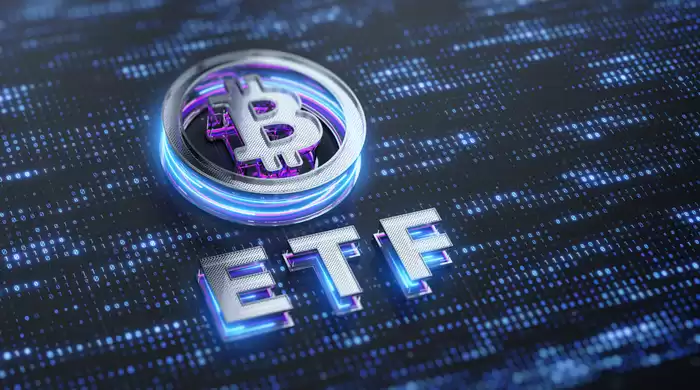-
 bitcoin
bitcoin $87959.907984 USD
1.34% -
 ethereum
ethereum $2920.497338 USD
3.04% -
 tether
tether $0.999775 USD
0.00% -
 xrp
xrp $2.237324 USD
8.12% -
 bnb
bnb $860.243768 USD
0.90% -
 solana
solana $138.089498 USD
5.43% -
 usd-coin
usd-coin $0.999807 USD
0.01% -
 tron
tron $0.272801 USD
-1.53% -
 dogecoin
dogecoin $0.150904 USD
2.96% -
 cardano
cardano $0.421635 USD
1.97% -
 hyperliquid
hyperliquid $32.152445 USD
2.23% -
 bitcoin-cash
bitcoin-cash $533.301069 USD
-1.94% -
 chainlink
chainlink $12.953417 USD
2.68% -
 unus-sed-leo
unus-sed-leo $9.535951 USD
0.73% -
 zcash
zcash $521.483386 USD
-2.87%
What fees are required to buy Bitcoin ETF?
When buying Bitcoin ETFs, factor in fees such as transaction fees, account management charges, custody costs, expense ratios, spreads, and varying costs based on order types (market vs. limit).
Oct 23, 2024 at 08:35 am

- Transaction fees: Each trade (buy or sell) typically incurs a transaction fee charged by the trading platform or brokerage.
- Account management fees: Some brokerages may charge an annual or monthly fee for maintaining your account.
- Custody fees: If the Bitcoin ETF requires cold storage or other secure storage, there may be an ongoing custody fee for holding your assets.
- Expense ratio: This is an annual fee charged by the ETF issuer to cover the fund's operating expenses, including management, marketing, and record-keeping.
- The spread is the difference between the bid (buy) price and the ask (sell) price of the ETF. The spread represents the market maker's profit and affects the overall cost of buying the ETF.
- Market orders: Executed immediately at the current market price, but may result in a wider spread and higher overall cost.
- Limit orders: Specify a desired price at which you want to buy or sell, ensuring a specific price or better. However, limit orders may not be filled if the market price does not reach your desired level.
- Transaction fee: $5-$10 per trade
- Expense ratio: 0.50%-1.00% annually
- Spread: 0.05%-0.20% of the ETF's share price
- Choose a brokerage with low fees.
- Consider ETFs with a lower expense ratio.
- Place limit orders to avoid paying a large spread.
- Avoid frequent trading to limit transaction fees.
Disclaimer:info@kdj.com
The information provided is not trading advice. kdj.com does not assume any responsibility for any investments made based on the information provided in this article. Cryptocurrencies are highly volatile and it is highly recommended that you invest with caution after thorough research!
If you believe that the content used on this website infringes your copyright, please contact us immediately (info@kdj.com) and we will delete it promptly.
- Super Bowl LX: Coin Toss Trends Point to Tails Despite Heads' Recent Surge
- 2026-01-31 07:30:02
- Aussie Prospector's Ancient Find: Japanese Relics Surface, Rewriting Gold Rush Lore
- 2026-01-31 07:20:01
- US Mint Adjusts Coin Prices: Clad Collector Sets See Significant Hikes Amidst Special Anniversary Releases
- 2026-01-31 07:20:01
- THORChain Ignites Fiery Debate with CoinGecko Over Bitcoin DEX Definitions: A Battle for True Decentralization
- 2026-01-31 07:15:01
- Fantasy Football Frenzy: Key Picks and Pointers for Premier League Round 24
- 2026-01-31 06:40:02
- Cryptocurrencies Brace for Potential Plunge in 2026 Amidst Market Volatility
- 2026-01-31 07:15:01
Related knowledge

How to get started with Bitcoin ETF investing with just $100?
Jan 22,2026 at 08:59pm
Understanding Bitcoin ETF Basics1. A Bitcoin ETF is a financial instrument traded on stock exchanges that tracks the price of Bitcoin without requirin...

What is the minimum amount you need to invest in a Bitcoin ETF?
Jan 18,2026 at 08:20am
Bitcoin ETF Investment Thresholds1. Bitcoin ETFs trade on traditional stock exchanges, meaning investors purchase shares just like any other publicly ...

How do I protect my Bitcoin ETF from market volatility?
Jan 18,2026 at 12:20pm
Understanding Bitcoin ETF Structure1. Bitcoin ETFs hold bitcoin or bitcoin futures contracts rather than the underlying asset directly, introducing st...

How to transfer your GBTC shares to a lower-cost Bitcoin ETF?
Jan 23,2026 at 04:20am
Understanding GBTC Share Conversion Mechanics1. Grayscale Bitcoin Trust (GBTC) operates as a closed-end fund, meaning its shares trade on the open mar...

What is the best time of day to buy or sell a Bitcoin ETF?
Jan 20,2026 at 02:39am
Market Hours and Liquidity Patterns1. Bitcoin ETFs trade on traditional stock exchanges like the NYSE and Nasdaq, which operate during standard U.S. m...

How to buy the ARK 21Shares Bitcoin ETF (ARKB)?
Jan 25,2026 at 10:39pm
Understanding ARKB Structure and Availability1. ARKB is a spot Bitcoin exchange-traded fund launched by ARK Invest and 21Shares in the United States. ...

How to get started with Bitcoin ETF investing with just $100?
Jan 22,2026 at 08:59pm
Understanding Bitcoin ETF Basics1. A Bitcoin ETF is a financial instrument traded on stock exchanges that tracks the price of Bitcoin without requirin...

What is the minimum amount you need to invest in a Bitcoin ETF?
Jan 18,2026 at 08:20am
Bitcoin ETF Investment Thresholds1. Bitcoin ETFs trade on traditional stock exchanges, meaning investors purchase shares just like any other publicly ...

How do I protect my Bitcoin ETF from market volatility?
Jan 18,2026 at 12:20pm
Understanding Bitcoin ETF Structure1. Bitcoin ETFs hold bitcoin or bitcoin futures contracts rather than the underlying asset directly, introducing st...

How to transfer your GBTC shares to a lower-cost Bitcoin ETF?
Jan 23,2026 at 04:20am
Understanding GBTC Share Conversion Mechanics1. Grayscale Bitcoin Trust (GBTC) operates as a closed-end fund, meaning its shares trade on the open mar...

What is the best time of day to buy or sell a Bitcoin ETF?
Jan 20,2026 at 02:39am
Market Hours and Liquidity Patterns1. Bitcoin ETFs trade on traditional stock exchanges like the NYSE and Nasdaq, which operate during standard U.S. m...

How to buy the ARK 21Shares Bitcoin ETF (ARKB)?
Jan 25,2026 at 10:39pm
Understanding ARKB Structure and Availability1. ARKB is a spot Bitcoin exchange-traded fund launched by ARK Invest and 21Shares in the United States. ...
See all articles










































































